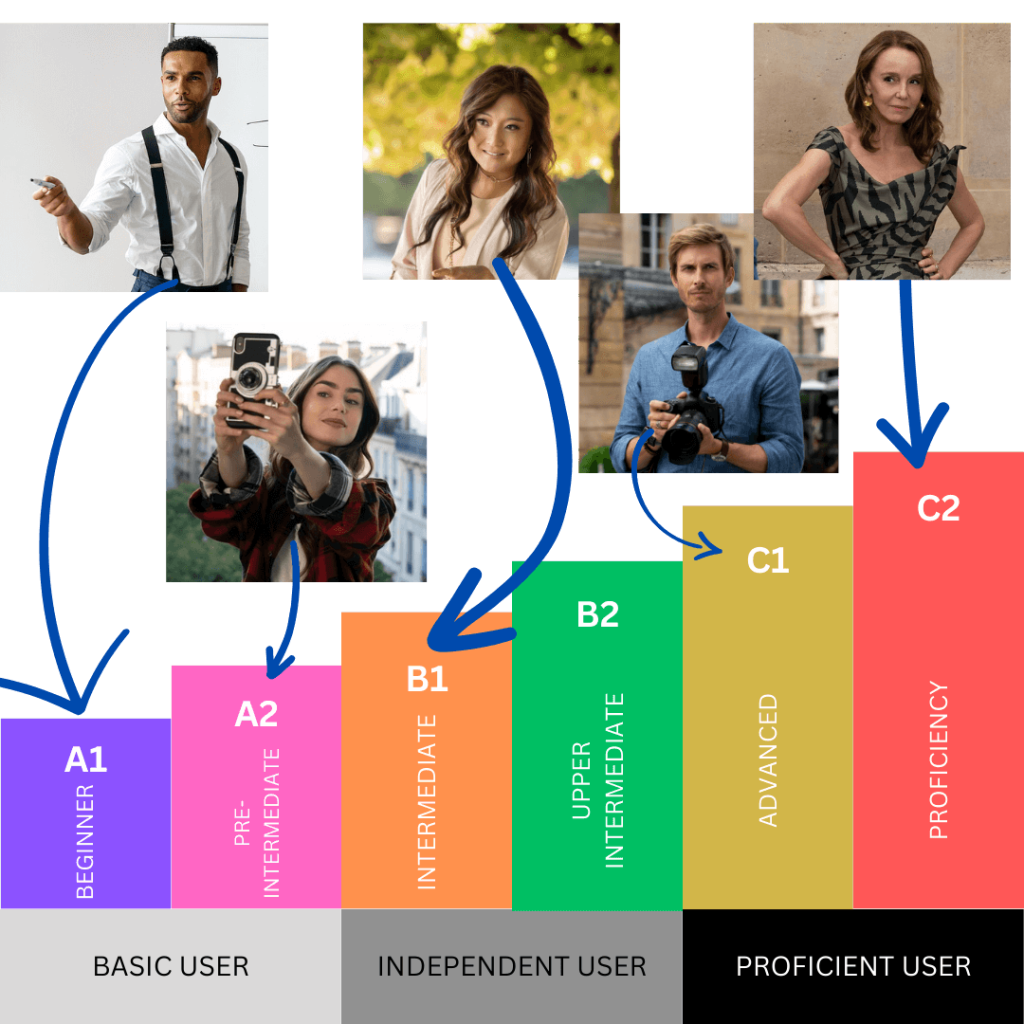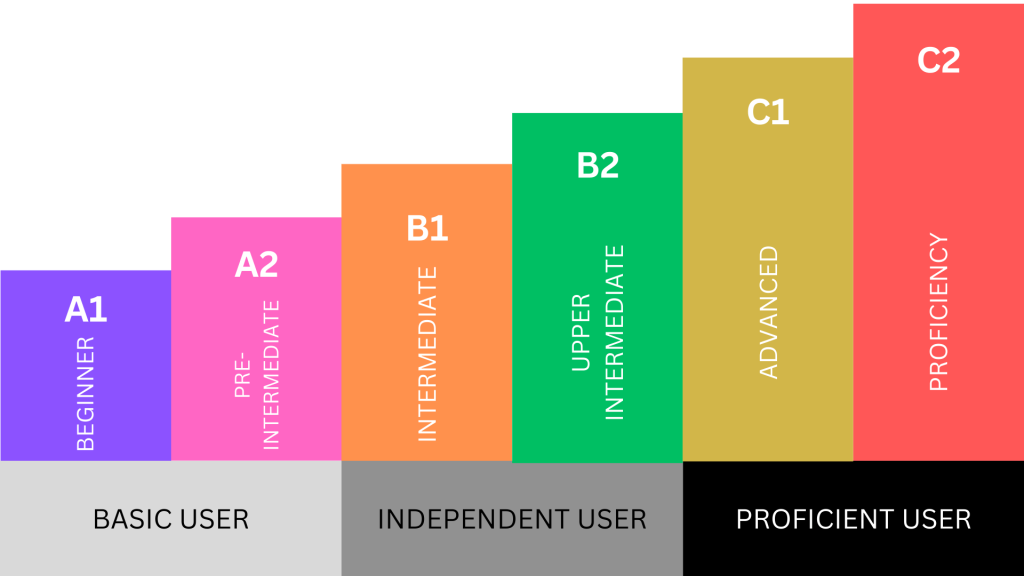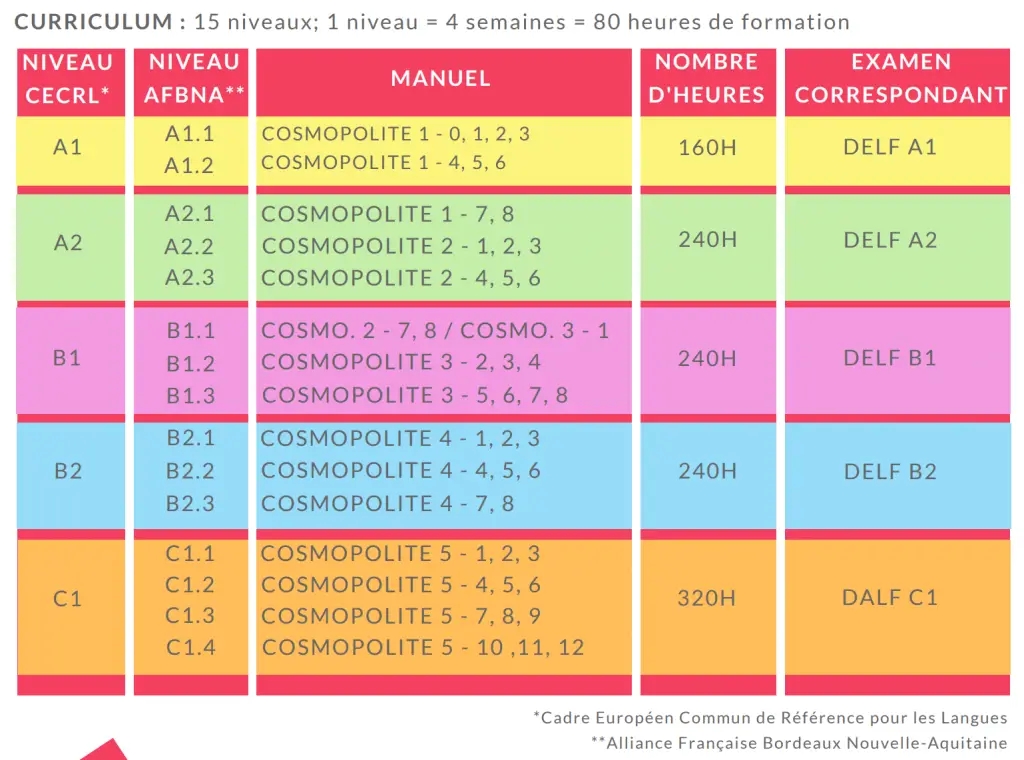Journalists Dolly Alderton and Pandora Sykes made having high and low brow tastes acceptable with their podcast The High Low. Well, my low is Emily in Paris. And I will watch it passionately to its inevitable demise.
In an attempt at something high brow, I’ve decided to explain the CEFR framework using our favourite characters from the show.

In all seriousness though, knowing what your competence level in your target language is the first step in building the right mindset to improve your skills at a rapid pace, so let’s get to it.
SPOILER ALERT! If you haven’t seen all three seasons of Emily in Paris, come back and read this once you have.
- What is CEFR?
- What level am I?
- What someone at each level might say or understand
- How long will it take me to get to the next level?
- Which exam can I do?
- Final thoughts
What is CEFR?
CEFR refers to the Common European Framework of Reference for Languages, which is an international standard for describing language ability. It’s organised into basic, independent and proficient user, which are then subdivided to more accurately describe language ability.
Bear in mind that these levels describe someone’s overall ability across the four skills of speaking, reading, writing and listening, whereas in reality, some people can have very different abilities per skill. Take someone who has grown up with parents who speak a different language to the language they were educated in, and whose parents use their native language with the child, but the child always replies in their education-associated language. This may mean that this person has B2 level listening skills, but A1-A2 level speaking skills.

What level am I?
There are many tests available online to test your language skills, all of varying reliability. Since a self-marking test can only ever take the format of multiple choice, and very often these tests focus purely on grammatical structures as indicators of someone’s level, they should be taken with a pinch of salt. Here are some tests I’ve tried before, and they come out pretty accurately in terms of identifying the level I know I have in each language.
What someone at each level might say or understand
A1: Alfie
“I am from England. I am single. I work in Paris. Brexit is Brexit. I like the pub. French is boring.”
READING LEVEL: Peppa Pig

A2: Emily

“I am from the United States but these days I live in Paris. I love Paris, but the French hate me. Last summer we went to Champagne to visit the family of my friend Camille; we drank wine and talked and laughed; it was really fun.”
READING LEVEL: The Gruffalo
B1: Mindy
“I’ve been living in Paris for the past year, but I am originally from China. I have been working as a nanny here but in reality I want to be a professional singer. Last week, my friends and I played music in the street, which brought us a lot of attention; it was great!”
READING LEVEL: Harry Potter / short blogs / social media / emails

B2
IF Emily in Paris hadn’t fallen into a massive plot hole by latterly giving Madeline some appalling French skills – despite her supposedly being competent enough to work in French at the beginning of season 1 – she’d fit right in here.
B2 is usually defined as “working level” in most organisations.

Here’s what she might have said:
“Things have been crazy here in Paris since I arrived! We’ve had problems with the office team and our clients are constantly making trouble. I have to say that I miss American corporate culture!”
READING LEVEL: Jurassic Park / in-depth blogs / ebooks
C1: Erik
Erik doesn’t actually speak much French in the series but his character bio describes him as multi-lingual, and Sylvie wouldn’t stoop herself to go out with someone who can’t speak her native tongue superbly.
“I should’ve known what I was getting into with Sylvie. I just wanted to introduce her to my friends, but at first she was apprehensive and didn’t want me to spill the beans about our love affair. Of course this is all water under the bridge now, given what happened. If I’d known that Sylvie was still in love with her ex-husband, I never would have gone after her. “
READING LEVEL: A Brief History of Time / white-papers

C2: Sylvie

“When it comes to working with Americans and French people, it’s like night and day. I don’t see the point of doing things by the book when you can get better results by breaking the rules.
That’s why Agent Grateau is going to break the mould set by companies like Savoir, enough of this americanisation of our beautiful city.”
READING LEVEL: An academic paper
Note that not all native speakers would pass a C2 exam; C2 level language is very much academic, complex, including a range of vocabulary and a strong understanding of grammar.
How long will it take me to get to the next level?
This is a difficult question to answer, because it differs for every person. Factors that can affect how quickly you progress can include:
- The complexity of the language you’re learning: for native English speakers, it will be much easier for you to learn Spanish (a category one language) than Mandarin (a category four language).
- The language family it belongs to: learning a language similar to your native language or other languages you speak will be a speedier process than for other languages.
- How regularly you study and how organised your learning is: this is why it’s worth knowing what level you’re currently at, so that you can track your progress.
- The methods and materials you’re using: using Duolingo daily will be less effective than reading a chapter of a graded reader once a week. Get that neuroplasticity going by visiting the culture section of my blog, where you can start to make strong connections between new language and context (films, songs, podcasts…), rather than trying to remember words from the same Duolingo screen.
Check out this table produced by Alliance Française Bordeaux, where I studied for 3 months, before passing my C1 exam (the DALF).
It shows how the school organises its classes. As you’ll see from the table, one sub-level is completed every week, with the whole level (A1-C1) considered “completed” after the number of weeks stipulated for each level.

Note: with schools, at quieter times of year, you may be placed in a class that is the closest to your level, and not your exact level, because of student numbers. This can mean that you are pulled back a bit or pushed forward, as I was. I arrived and was put in a B2.3 class for two weeks, and was then moved up to the C1.3 because there weren’t enough students to make up C1.1 or C1.2. This meant that I didn’t cover the whole C1 curriculum, but was still able to sit the official C1 exam. This was possible because you’re supposed to know all grammar points by the end of B2, so C1 is purely content based (i.e. focused on expanding your vocabulary).
Check out my post on choosing a language course abroad that suits your needs.
For tips on mindset and learning techniques, check out my How to start learning any language: treat it like a crime you’re trying to solve post. For how to get your French to C1, read my How I reached C1 French in 3 months after 21 years of struggling post. For advice on graduating from A2 to working-level Spanish, here’s my How I went from A2 Spanish to landing a Spanish-speaking job in 6 months post. And for speedy progress in French, Spanish, English or German, check out my Should you try the Lingoda language sprint? Here’s my experience and advice post.
Which exam can I do?
If you would like to work towards an exam, whether as a personal goal or to pursue a professional opportunity or study abroad, you’ll need to know which exam to take. Most universities require at least B2 level. Each language has its own acronym for CEFR exams, and the acronym can vary depending on the level:
| LANGUAGE | EXAM | LEVEL |
| Spanish | DELE: diploma de español como lengua extranjera (Diploma of Spanish as a Foreign Language) | A1, A2, B1, B2, C1, C2 |
| Portuguese (CAPLE exams) | CIPLE (Certificado Inicial de Português Língua Estrangeira) | A2 |
| DEPLE (Diploma Elementar de Português Língua Estrangeira) | B1 | |
| DIPLE (Diploma Intermédio de Português Língua Estrangeira) | B2 | |
| DAPLE (Diploma Avançado de Português Língua Estrangeira) | C1 | |
| DUPLE (Diploma Universitário de Português Língua Estrangeira) | C2 | |
| French | DELF: Diplôme d’Etudes en Langue Française (Diploma in French language studies) | A1, A2, B1, B2 |
| DALF: Diplôme Approfondi de Langue Française (Advanced Diploma in French Language) | C1, C2 | |
| Italian | CELI: Certificato di conoscenza della lingua italiana (Certificate of the Italian Language) | A1, A2, B1, B2, C1, C2 |
| CILS: Certificazione di Italiano come Lingua Straniera (Italian Certificate as a Foreign Language) | A1, A2, B1, B2, C1, C2 |
Final thoughts
Knowing your level in the language you’re learning is a really great way to track your progress, and can inform your tasks, such as what to read, for example. Graded readers are an excellent way to improve your listening and reading skills and to expand your knowledge of grammar and vocabulary per CEFR level.
And despite what so many click-baity articles might tell you, watching Emily in Paris will not improve your French. It will, however, entertain, so keep watching!
Do you find it useful to track your progress along the CEFR system? Do you identify with the character at your learning level? What tips would you give others to “graduate” to the next level? Comment below!
Psst! If you liked this post, please give it a like below 😊👇!


Leave a comment